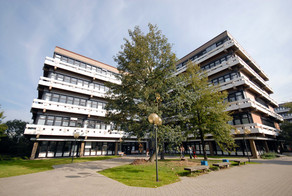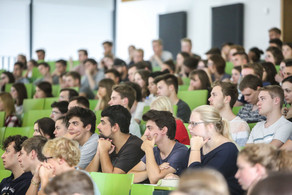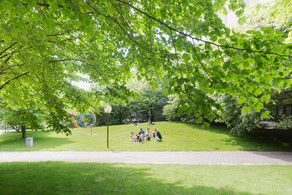Prof. Dr. Peter Wühr
Arbeitsschwerpunkte
- Aufmerksamkeit (z.B. selektive Aufmerksamkeit; inhibitorische Prozesse)
- Handlungssteuerung und exekutive Funktionen (z.B. räumliche Reiz-Reaktions-Kompatibilität; Konfliktregulation)
- Wahrnehmung (z.B. Handlungs-Wahrnehmungs-Interferenzen)
- Übungseffekte in Aufmerksamkeits-/Konzentrationstests (z.B. d2, FAIR-2)
- Wahrnehmung und Aufmerksamkeit im Sport (z.B. Abseitsentscheidungen im Fußball)
Sprechzeiten
Sprechstunden finden nur nach Vereinbarung (per Email) statt.
Bitte beachten Sie: Etwaige Ausfälle der Sprechzeiten werden unter Studium > Aktuelles > Sprechstunden bzw. per Aushang bekannt gegeben.
Weitere Informationen
seit 10/2022
Akademischer Oberrat
Institut für Psychologie, TU Dortmund
2018
Ernennung zum außerplanmäßigen (apl.) Professor an der TU Dortmund
2010
Um-Habilitation an die TU Dortmund
seit 2009
Akademischer Rat
Institut für Psychologie, TU Dortmund
2008-2009
Studienrat im Hochschuldienst
Institut für Psychologie, TU Dortmund
2004-2008
Oberassistent (C2)
Institut für Psychologie, Universität Erlangen
2004
Venia legendi (Habilitation) für die gesamte Psychologie
2001-2004
Wissenschaftlicher Assistent (C1)
Institut für Psychologie, Universität Erlangen
2000
Promotion zum Dr.phil. (Prädikat: summa cum laude)
Ludwigs-Maximilians-Universität München
1996-2001
Wissenschaftlicher Mitarbeiter
Max-Planck-Institut für psychologische Forschung (Abt. Kognition & Handlung), München
1996
Diplom in Psychologie
Universität Osnabrück
1989-1996
Studium der Psychologie
Universität Regensburg und Universität Osnabrück
- Aufmerksamkeit (z.B. selektive Aufmerksamkeit; inhibitorische Prozesse)
- Handlungssteuerung und exekutive Funktionen (z.B. räumliche Reiz-Reaktions-Kompatibilität; Konfliktregulation)
- Wahrnehmung (z.B. Handlungs-Wahrnehmungs-Interferenzen)
- Übungseffekte in Aufmerksamkeits-/Konzentrationstests (z.B. d2, FAIR-2)
- Wahrnehmung und Aufmerksamkeit im Sport (z.B. Abseitsentscheidungen im Fußball)
Artikel in Zeitschriften mit Gutachtersystem
In Press
- ...
2025
- Wühr, P., & Heuer, H. (2025). Where does the processing of size meet the processing of space? Attention, Perception, & Psychophysics, 87(4), 1230-1248.
- Wühr, P., Furley, P., Mertes, M., & Memmert. D. (2025). A home advantage in offside decisions in German professional football (soccer). Collabra Psychology, 11(1), 133671 (open access).
- Heuer, H., & Wühr, P. (2025). The functional role of the task-irrelevant stimulus feature for the congruency sequence effect. Journal of Experimental Psychology: Learning, Memory, & Cognition, 51(5), 704-736.
2024
- Richter, M., & Wühr, P. (2024). Verbal stimuli allow for symmetrical S-R priming effects between size and space. Scientific Reports (accepted, October 25, 2024).
- Richter, M., & Wühr, P. (2024). Different grasping experiences affect mapping effects but not correspondence effects between stimulus size and response location. Psychological Research, 88, 2021-2035.
- Richter, M., & Wühr, P. (2024). The reciprocity of spatial-numerical associations of verbal response codes depends on stimulus mode. Memory & Cognition, 52, 944-964.
- Wühr, P., Richter, M., & Seegelke, C. (2024). Handedness and effector strength modulate a compatibility effect between stimulus size and response position with manual and vocal responses. Journal of Experimental Psychology: Human Perception & Performance, 50, 263-279.
2023
- Seegelke, C., Richter, M., Heed, T., & Wühr, P. (2023). Exploring the response code in a compatibility effect between physical size and left/right responses: The hand is more important than location. Journal of Experimental Psychology: Human Perception & Performance, 49, 1485-1502.
- Richter, M., & Wühr, P. (2023). Associations between physical size and space are strongly asymmetrical. Scientific Reports, 13, Article 16256 (open access).
- Heuer, H., & Wühr, P. (2023). The impact of speed-accuracy instructions on spatial congruency effects. Journal of Cognition, 6(1): 49 (open access).
- Richter, M., & Wühr, P. (2023). Spatial-numerical associations of manual response codes are strongly asymmetrical. Cognition, 238, Article 105538.
- Wühr, P., & Memmert, D. (2023). A color-related bias in offside judgments in professional soccer: A matter of figure-background contrast? PLoS-One, 18(5): e0385500 (open access).
- Wühr, B., & Wühr, P. (2023). Disentangling the contributions of repeating targets, distractors, and stimulus positions to practice benefits in d2-like tests of attention. Collabra: Psychology (open acess).
- Heuer, H., Seegelke, C., & Wühr, P. (2023). Staggered onsets of processing relevant and irrelevant stimulus features produce different dynamics of congruency effects. Journal of Cognition, 6(1): 8, pp. 1–24 (open access).
2022
- Wühr, P. & Richter, M. (2022). Relative, not absolute, stimulus size is responsible for a correspondence effect between physical stimulus size and left/right responses. Attention, Perception & Psychophysics, 84, 1342-1358.
- Richter, M. & Wühr, P. (2022). The nature of associations between physical stimulus size and left-right response codes. Journal of Cognition, 5, 1-18 (open access).
- Wühr, P. & Heuer, H. (2022). Mapping effects in choice-response and go/nogo variants of the lexical-decision task: A case for polarity correspondence. The Quarterly Journal of Experimental Psychology, 75, 491-507.
- Wühr, B. & Wühr, P. (2022). Effects of repeated testing in a pen-and-paper test of selective attention (FAIR-2). Psychological Research, 86, 294-311.
2021
- Lange, B., Wühr, P., & Schwarz, S. (2021). Of time gals and mega men: Empirical findings on gender differences in digital game genre preferences and the accuracy of respective gender stereotypes. Frontiers in Psychology, 12:657430 (open access).
2020
- Wühr, P., Fasold, F., & Memmert, D. (2020). The impact of team preferences on offside judgments in laypersons: A quasi-experimental study. Cognitive Research: Principles and Implications, 5:50 (open access).
- Klümper, L., Wühr, P., Hassebrauck, M., & Schwarz, S. (2020). Automaticity of facial attractiveness perception and sex-specific mating strategies. Cognition (preprint).
- Wühr, P., & Ansorge, U. (2020). Do left-handers outperform right-handers in paper-and-pencil tests of attention? Psychological Research, 84, 2262-2272.
- Wühr, P., & Heuer, H. (2020). To respond or not to respond? A model-based comparison between the processing of go. nogo, and neutral stimuli. Journal of Experimental Psychology: Human Perception & Performance, 46, 525-549.
2019
- Wühr, P. (2019). Target-specific learning contributes to test-retest practice gains in the d2 sustained-attention test. Swiss Journal of Psychology, 78, 29-35.
- Fasold, F., Wühr, P., & Memmert, D. (2019). Response requirements affect offside judgments in football (soccer). Psychological Research, 83, 924-934.
2018
- Seegelke, C. & Wühr, P. (2018). Compatibility between object size and response side in grasping: The left hand prefers smaller objects, the right hand prefers larger objects. PeerJ, 6:e6026, (open access).
- Wühr, P., Frings, C., & Heuer, H. (in press). Response preparation with reliable cues decreases response competition in the flanker task. Experimental Psychology, 65, 286-296.
- Wühr, P. & Heuer, H. (2018). The impact of anatomical and spatial distance between responses on response conflict. Memory & Cognition, 46, 994-1009.
- Wühr, P. & Seegelke, C. (2018). Compatibility between physical stimulus size and left-right responses: Small is left and large is right. Journal of Cognition, 1, article 17 (open access).
2017
- Wühr, P. & Heuer, H. (2017). How social and refractory is the social psychological refractory period? Experimental Psychology, 64, 273-281.
- Wühr, P., Lange, B., & Schwarz, S. (2017). Tears or fears? Comparing gender stereotypes about movie preferences to actual preferences. Frontiers in Psychology, 8, Article 428 (open access).
- Wühr, P. & Heuer, H. (2017). Response preparation, response conflict, and the effects of irrelevant flanker stimuli. Advances in Cognitive Psychology, 13, 70-82 (open access).
2016
- Wühr, P. & Schwarz, S. (2016). Die hard in Notting Hill: Gender differences in recalling contents from action and romantic movies. Applied Cognitive Psychology, 162, 13-19.
2015
- Wühr, P. & Heuer, H. (2015). The impact of response frequency on spatial stimulus-response correspondence effects. Acta Psychologica, 162, 13-19.
- Wühr, P., Fasold, F. & Memmert, D. (2015). Soccer offside judgments in laypersons with different types of static displays. PLoS One, 10(8).
- Wühr, P., Duthoo, W. & Notebaert, W. (2015). Generalizing attentional control across dimensions and tasks: Evidence from transfer of proportion-congruent effects. Quarterly Journal of Experimental Psychology, 68, 779-801.
- Wühr, P. & Heuer, H. (2015). The coding of repetitions and alternations in action sequences: Spatial or relational? Psychological Research, 79, 432-445.
2014
- Frings, C. & Wühr, P. (2014). Top-down deactivation of interference from irrelevant spatial or verbal stimulus features. Attention, Perception & Psychophysics, 76, 2360-2374.
- Müsseler, J., Wühr, P. & Ziessler, M. (2014). Using tools with real and imagined tool movements. Frontiers in Psychology, 5, Article 515.
2013
- Duthoo, W., Wühr, P. & Notebaert, W. (2013). The hot-hand fallacy in cognitive control: Repetition expectancy modulates the congruency sequence effect. Psychonomic Bulletin & Review, 20, 798-805.
2012
- Berti, S. & Wühr, P. (2012). Using redundant visual information from different dimensions for attentional selection. Journal of Psychophysiology, 26, 99-104.
- Duthoo, W., De Baene, W., Wühr, P. & Notebaert, W. (2012). When predictions take control: The effect of task predictions on task-switching performance. Frontiers in Cognition, 3, Article 282.
- Frings, C., Wentura, D. & Wühr, P. (2012). On the fate of distractor representations. Journal of Experimental Psychology: Human Perception and Performance, 38, 570-575.
- Frings, C. & Wühr, P. (2012). Don't be afraid of irrelevant words. Emotional Stroop effects are confined to attended words. Cognition & Emotion, 26, 1056-1068.
- Janczyk, M. & Wühr, P. (2012). Inhibition does not always cause emotional devaluation: No evidence for retrieval-induced devaluation. Experimental Psychology, 59, 372-378.
- Reuss, H., Kiesel, A., Kunde, W. & Wühr, P. (2012). A cue from the unconscious - masked symbols prompt spatial anticipation. Frontiers in Cognition, 3, Article 397.
2011
- Wühr, P. (2011). Working memory load decreases mapping effects in spatial-compatibility tasks. Psychological Research, 75, 393-405.
- Wühr, P. & Biebl, R. (2011). The role of working memory in spatial S-R correspondence effects. Journal of Experimental Psychology: Human Perception and Performance, 37, 442-454.
- Wühr, P. & Koch, I. (2011). Independence of serial position and response conflict in pre-planned manual response sequences. Acta Psychologica, 138, 272-280.
- Verguts, T., Notebaert, W., Kunde, W. & Wühr, P. (2011). Post-conflict slowing: Cognitive adaptation after conflict processing. Psychonomic Bulletin & Review, 18, 76-83.
2010
- Wühr, P., & Huestegge, L. (2010). The impact of social presence on voluntary and involuntary control of spatial attention. Social Cognition, 28, 145-160.
2009
- Ansorge, U. & Wühr, P. (2009). Transfer of response codes from choice-response to go-nogo tasks. The Quarterly Journal of Experimental Psychology, 62, 1216-1235.
- Wühr, P. & Biebl, R. (2009). Logical recoding of S-R rules can reverse the effects of spatial S-R correspondence. Attention, Perception & Psychophysics, 71, 248-257.
- Wühr, P., Biebl, R., Umilta, C. & Müsseler, J. (2009). Perceptual and attentional factors in encoding irrelevant spatial information. Psychological Research, 73, 350-363.
- Wühr, P. & Frings, C. (2009). Inhibition is picky: Shape difference is a necessary condition for attentional inhibition of irrelevant objects. Psychonomic Bulletin & Review, 16, 839-844.
2008
- Wühr, P. & Kunde, W. (2008). Die kognitive Regulation von Handlungskonflikten. Psychologische Rundschau, 59, 207-216.
- Wühr, P. & Kunde, W. (2008). Pre-cueing spatial S-R correspondence: Is there regulation of expected response conflict? Journal of Experimental Psychology: Human Perception and Performance, 34, 872-883.
- Wühr, P., Biebl, R. & Ansorge, A. (2008). The impact of stimulus and response variability on S-R correspondence effects. Journal of Experimental Psychology: Learning, Memory, & Cognition, 34, 533-545.
- Wühr, P. & Frings, C. (2008). A case for inhibition: Visual attention suppresses the processing of irrelevant objects. Journal of Experimental Psychology: General, 137, 116-130.
2007
- Frings, C. & Wühr, P. (2007). Prime-display offset modulates negative priming only for easy-selection tasks. Memory & Cognition, 35, 504-513.
- Frings, C. & Wühr, P. (2007). On distractor-repetition effects in the negative-priming paradigm. Visual Cognition, 15, 166-178.
- Wühr, P. (2007). A Stroop effect for spatial orientation. The Journal of General Psychology, 134, 285-294.
- Wühr, P. & Ansorge, U. (2007). A Simon effect in memory retrieval: Evidence for the response-discrimination account. Psychonomic Bulletin & Review, 14, 984-988.
- Wühr, P. & Elsner, B. (2007). Effects of irrelevant stimulus orientation on visually-guided grasping movements. Behavioral Neuroscience, 121, 301-309.
2006
- Kunde, W. & Wühr, P. (2006). Sequential modulations of correspondence effects across spatial dimensions and tasks. Memory & Cognition, 34, 356-367.
- Müsseler, J., Wühr, P. & Umiltà, C. (2006). Processing of irrelevant location information under dual-task conditions. Psychological Research, 70, 459-467.
- Wühr, P. (2006). Cueing of object orientation facilitates attentional selection of relevant objects. Spatial Vision, 19, 459-477.
- Wühr, P. (2006). Response preparation modulates interference from irrelevant spatial information. Acta Psychologica, 122, 206-220.
- Wühr, P. & Kunde, W. (2006). Spatial correspondence between onsets and offsets of stimuli and responses. European Journal of Cognitive Psychology, 18, 359-377.
- Wühr, P. (2006). The Simon effect in vocal responses. Acta Psychologica. 121, 210-226.
2005
- Müsseler, J., Koch, I. & Wühr, P. (2005). Testing the boundary conditions for processing irrelevant location information: The cross-task Simon effect. European Journal of Cognitive Psychology, 17, 708-126.
- Müsseler, J., Wühr, P., Danielmeier, C. & Zysset, S. (2005). Action-induced blindness with lateralized stimuli and responses: The role of the cerebral hemispheres. Experimental Brain Research, 160, 214-222.
- Wühr, P. (2005). Evidence for gating of direct response activation in the Simon task. Psychonomic Bulletin & Review, 12, 282-288.
- Wühr, P. & Ansorge, U. (2005). Exploring trial-by-trial modulations of the Simon effect. The Quarterly Journal of Experimental Psychology, 58A, 705-731.
- Wühr, P. & Müsseler, J. (2005). When do irrelevant visual stimuli impair processing of identical targets? Perception & Psychophysics, 67, 897-909.
- Wühr, P. & Weltle, M. (2005). Depth cues do not underlie attentional modulations of the Stroop effect. Memory & Cognition, 33, 676-680.
2004
- Ansorge, U. & Wühr, P. (2004). A response-discrimination account of the Simon effect. Journal of Experimental Psychology: Human Perception and Performance, 30, 365-377.
- Kunde, W. & Wühr, P. (2004). Actions blind to conceptually overlapping stimuli. Psychological Research, 68, 199-207.
- Wühr, P. (2004). Sequential modulations of logical-recoding operations in the Simon task. Experimental Psychology, 51, 98-108.
2003 und früher
- Wühr, P. & Waszak, F. (2003). Object-based attentional selection can modulate the Stroop effect. Memory & Cognition, 31, 983-994.
- Wühr, P. & Müsseler, J. (2002). Blindness to response-compatible stimuli in the psychological-refractory-period paradigm. Visual Cognition, 9, 421-457.
- Wühr, P. & Müsseler, J. (2001). Time course of the blindness to response-compatible stimuli. Journal of Experimental Psychology: Human Perception and Performance, 27(5), 1260-1270.
- Müsseler, J., Steininger, S. & Wühr, P. (2001). Can actions affect perceptual processing. The Quarterly Journal of Experimental Psychology, 54A, 137-154.
- Müsseler, J., Wühr, P. & Prinz, W. (2000). Varying the response code in the blindness to response-compatible stimuli. Visual Cognition, 7, 743-767.
Bücher und Buchkapitel
- Schwarz, S., Lange, B. P., & Wühr, P. (2018). Geschlechtsunterschiede im Filmgeschmack - Ursachen, Ausmaß und Konsequenzen für die Informationsverarbeitung. In C. Schwender, S. Schwarz, B. P. Lange, & A. Huckauf (Hrsg.), Geschlecht und Verhalten aus evolutionärer Perspektive (Seite 259-271). Lengerich: Pabst.
- Wühr, P. (2011). Die Planung und Steuerung von Handlungen. In: A. Schütz, H. Selg, M. Brand und S. Lautenbacher (Hrsg.): Psychologie. Eine Einführung in ihre Grundlagen und Anwendungsfelder. 4. Auflage. Stuttgart: Kohlhammer, S.139-154.
- Müsseler, J., & Wühr, P. (2002). Response-evoked interference in visual encoding. In W. Prinz & B. Hommel (Hrsg.). Common mechanisms in perception and action. Attention & Performance XIX. Oxford: Oxford University Press, S.520-537.
- Wühr, P. (2000). Sieht man immer was man tut? Wie Handlungen die visuelle Wahrnehmung beeinflussen. Berlin: Logos Verlag.
seit 2015
Psychological Research
Mitglied des Editorial Advisory Board
2016-2018
Advances in Cognitive Psychology
Mitglied des Editorial Board
2021 - 2023
DFG-Projekt
„Kompatibilitätseffekte zwischen der physikalischen Größe von Reizobjekten und Reaktionspositionen“ (Personalmittel für 1 wissenschaftliche Mitarbeiterstelle und Hilfskräfte sowie Sachmittel für insgesamt 3 Jahre).
2006 - 2009
DFG-Projekt
„Ursachen und Regulation von Reaktionskonflikten“ (Personalmittel für 1 wissenschaftliche Mitarbeiterstelle und Hilfskräfte sowie Sachmittel für insgesamt 3 Jahre).
2006
Beratervertrag mit der Fa. BMW (Standort: Wackersdorf)
im Rahmen eines Projekts zur „Analyse von Arbeitsplätzen in der Cockpitproduktion“ (gemeinsam mit Prof. Dr. C. Meinecke).
2002 - 2005
DFG-Projekt
„Objekt-basierte Aufmerksamkeit und Stroop-Interferenz“ (Personalmittel für 1 wissenschaftliche Mitarbeiterstelle und Hilfskräfte sowie Sachmittel für insgesamt 3 Jahre).
- Deutsche Gesellschaft für Psychologie (DGPs)
- Deutscher Hochschulverband (DHV)
- European Society for Cognitive Psychology (ESCOP)
- Psychonomic Society (Fellow)





